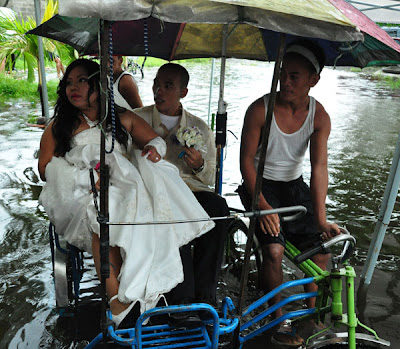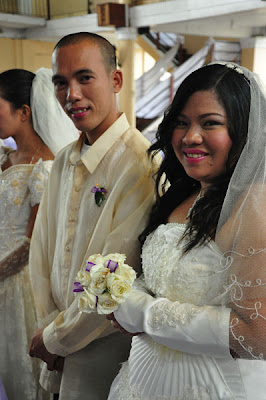





Manila, Philippines, June 25, 2011
Rains and floods did not even stop them! 563 couples in 66 branches nationwide exchanged vows and tied the knot despite of Falcon’s raging winds and rain as KMBI spearheaded its annual mass wedding.

I love this couple. No flood can stop them from heading up to the altar.
“Malaki ang tulong nito. Una, spiritually blessed ka ng God, blessed ka ng minister, blessed ka ng society...so malaki ang benefit nito,” (This really helps. First, you are blessed by God, you are blessed by the minister, you are blessed by the society...so it’s really beneficial,”) says Mr. Joel Clavecilla, branch manager of Tandang Sora, Quezon City.

It was an emotional, fun- and Spiritual-filled event as these couples made a covenant before men and God in the sanctity of marriage. Couples from Valenzuela branch even had to ride on a truck and pedicab, with the brides’ wedding gowns safely kept in a plastic bag, just to make it to the venue.

The dashing groom and the blushing bride. Pure bliss and hope for the future.
For some, it was a dream come true as some couples had concerns as to what kind of wedding and church they would attend because of difference in religious beliefs.

After the wedding ceremonies, the couples feasted on the food during the reception.
Ronalyn Marino, a program member from Tandang Sora and a Catholic, who got married to Radia Solaiman Disomimba, a Muslim, said that she’s grateful because KMBI has prepared an ecumenical wedding for couples like them aside from the financial support it gave for the wedding. “Maraming problem – sa religion, sa family...ngayon, binigay sa amin ng KMBI ang pagsasama na tiyak para sa kanya...Para maging legal ang pamilya namin, maging legal yung pagsasama namin.” (There were problems – in religion and family...now KMBI gave us the kind of wedding that suits him...to legalize our family and our relationship.”) Ronalyn and Radia already have a child.

No wedding would be complete without the multi-tiered cake. In this case, what they had were cupcakes.
The ecumenical mass wedding was joined by couples of different spiritual background and orientation who have been living together and most already have children. This is one of the organization’s major activities that are being taken care of by the Transformation Department. It aims to reach one of the components of its SEES (Spiritual, Economic, Environmental, Social) program, which is to draw people near to God and have a deeper relationship with Him.




"I usually avoid relatives who come for a visit from abroad and come bearing gifts," I admitted rather drily to my high school mate as we shared a table during recess.
"They always give these K-Mart or Walmart-bought things and declare that they're the latest in fashion. Like last time, my mom asked me to wear this pair of cheap canvas shoes that were made in Korea brought by a distant cousin from Canada. It even had a price tag on and it's a dollar worth. I felt like a refugee being given a relief item." He nodded in agreement while munching on a burger.
That distant memory brought me a slight pang of guilt. For a teenager who was more concerned with what’s the latest in fashion, reads Teen Beat, catches the latest episodes of American shows on TV and swings to the songs of the B-52 or Billy Idol, getting these ‘balikbayan gifts’ from my US-based relatives were also a tedious affair of having to show grateful smiles and that robotic, forced ‘thank you’ I never meant.
“Don’t they actually get to read what’s on the latest trends and what is cool? They’re already in America for Pete’s sakes,” I would say that to myself beneath my sighs as I open these dime-store cheap gifts.
I have, like many households in our old neighborhood in Balic-Balic, have tons of relatives in abroad, mainly in the North American continent. Most of them have set foot in the U.S. and Canada by way of marrying an American/Canadian citizen, or waiting for years for that sponsored migration from other relatives. Many a time they’d be coming straight from the provinces then into the land of milk and honey, never setting foot in the big city. The bright lights of, say, New York, Toronto or Los Angeles would be dazzling for many of them who are more accustomed to the whizzing of the mosquitoes in the dark and the light coming from the single naked lightbulb. Most of these relatives are themselves escapees from the poverty that was prevalent back then in their lives - the kind of life my own parents have shielded us from.
It was only years later when I realized that for every dollar’s worth of gift they’d send us back here in Manila, it was, for them, equivalent to thousands of pesos they never could have had here if they stayed.
But among these relatives of mine who’d send us gifts, one stood out. She’s my Tita Bong (or Aunt Nelly) who worked for years, not in North America, but in the Middle East. The youngest sister of my mother, she was also wet nurse to my younger brother and I when we were babies.
I always look forward every time she’d fly in for vacation and would eagerly open the gifts she had for us in her bulging luggage. I was 13, when she gave me a pair of Bali shoes. I had no idea that they were adult shoes but I could tell it was expensive. The leather felt really nice and the heels were sturdy. The best part of it was, while everyone was wearing the standard Marikina-made shoes, mine was BALI - the same brand of shoes I once saw in an ad in a glossy men’s fashion magazine. Or that time when she gave me a pair of really cool Levi’s when I was 16. They fit me so well and it was the latest cut from the jeans maker that I became a hit in school. I remember sneaking out of our house one school weekend wearing those jeans so I could go to Mars disco in Makati to be with the cool kids. It felt good to be a cool kid in those jeans.
The year I turned 18 was also the last year when she came in from abroad. She had decided to come back for good and eventually settle in our home province in Iloilo.
“Oh, there,” she said as she pointed to a pair of sleek, light-grey-bluish canvas shoes with leather heels, “That’s a pair of shoes my boss’s youngest son wore when he went to a disco in Paris. He only used it once and I found it the next day in the trash bin. He said somebody else wore the same pair.” My eyes went round in excitement when I saw how cool the shoes looked and was already imagining in my mind that it’d go well with a pair of black jeans I was thinking of wearing on my next disco escapade.
“Wait, Tita. Somebody else owned these shoes?” I asked her while caressing the shoes.
“Of course! What do you think? I’ll buy those ridiculously expensive things? I clean the rooms of my boss’ sons and if they put something in the trash bin, I would get those and bring them back here,” she said. I was dumbstruck. All these times, I was getting things other people already wore and threw away?! And to think, I belittle the cheap, but newly bought ones I get from my other relatives from the States.
I suppose she saw how my hands were slowly putting down the shoes when she added, “But I save the best ones for you though. I know you hate getting cheap stuff and you also have better taste than your other cousins. And besides, do you think you will ever have a relative who can afford to give you those things as gifts, even if they’re secondhand? Aber…?”
She has a point. And I always wore those things she gave me as if they’re the most expensive things in the world. Because in all honesty, to my young mind, they really were.







